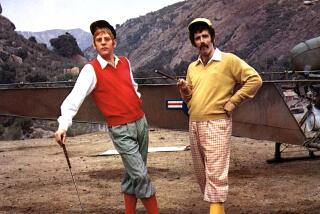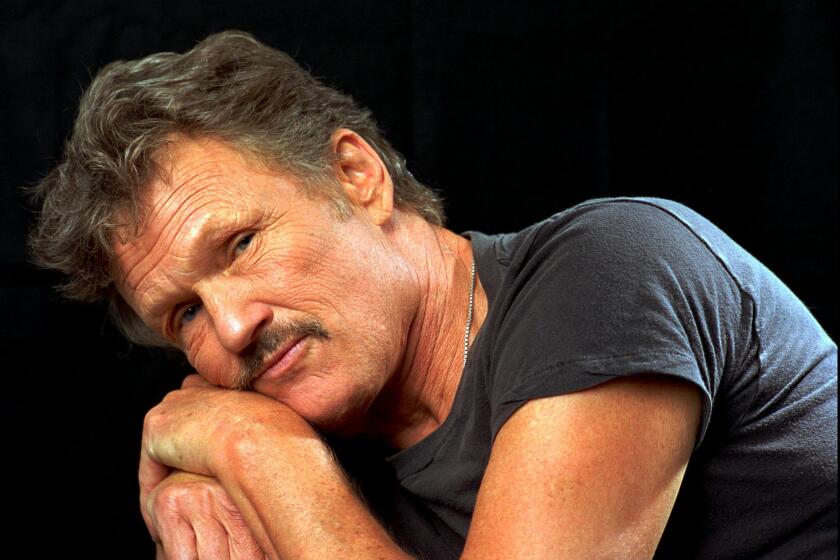From the Archives: Poet Allen Ginsberg dies at 70
Allen Ginsberg, the Beat Generation poet and counterculture guru whose outsized personality, daring verse and scalding political critiques ranged over five decades and profoundly influenced American life and literature, died Saturday at age 70, just days after being diagnosed with liver cancer.
Ginsberg, whose angry, anti-establishment and sexually explicit poem “Howl,” published in 1956, was considered a revolutionary event in American poetry, was surrounded by a group of “close friends and old lovers” in his New York apartment when he died.
“He went the way he wanted to go,” said poet Lawrence Ferlinghetti, who was tried on obscenity charges in 1957 for publishing “Howl.” “No life-support systems. He just had a Buddhist vigil all night long.”
Poet and critic J.D. McClatchy, editor of the Yale Review, said Ginsberg was “as much a social force as a literary phenomenon. Like [Walt] Whitman, he was a bard in the old manner--outsized, darkly prophetic, part exuberance, part prayer, part rant.”
Ginsberg, McClatchy said, “unzipped the polite literary fashions of the 1950s and offered a voice for the tumultuous, disaffected decades that followed. His work is a history of our era’s psyche, with all its contradictory urges.”
Gary Snyder, Pulitzer Prize-winning poet and charter member of the poetic rebels who challenged American literary and political conformity in the 1950s, said Ginsberg’s “willingness to put himself out there as a poet, a performer and a speaker brought poetry into a cultural and political relevance that it had never known before.”
Because of Ginsberg, Snyder said, “Poetry became the way the antiwar movement, the civil rights movement and now the ecology movement speaks to itself and to the outside world.”
Asked once to describe his political and social views, Ginsberg said simply: “Absolute defiance.”
Ginsberg’s poetry influenced the music of Bob Dylan, Yoko Ono and Patti Smith, the poetry of Czech President Vaclav Havel, and the in-your-face political antics of Abbie Hoffman and other radicals. Ginsberg invented the term “flower power” in the 1960s, and, as testament to durability, was a favorite on MTV in the 1990s.
“Dylan said he was the greatest influence on the American poetic voice since Whitman,” said Gordon Ball, Ginsberg’s editor and friend for 30 years. “I think that’s certainly true.”
That’s an evaluation few would challenge, although some would suggest that the influence was not always positive.
Ginsberg has been criticized for celebrating drug usage and promiscuity. Critics have said that he and other Beat poets undermined respect for language with the notion that all self-expression, regardless of how undisciplined or indecipherable, is worthy of being called poetry.
Political Radical
Ginsberg’s voluminous poems tore relentlessly at American materialism, imperialism and hypocrisy, exalted the joys of homosexuality and drug use, promoted socialism as the ideal form of government, and gave anguished voice to his own inner torment and insecurity.
The descent of his mother, Naomi, into madness and death in 1956 led to what many critics believe to be Ginsberg’s finest work, “Kaddish,” with its image of his mother during her frequent stays in mental institutions: “Back! You! Naomi! Skull on you! Gaunt immortality and revolution come--small broken woman--the ashen indoor eyes of hospitals, ward grayness on skin.”
Like Whitman, whom he idolized, Ginsberg was contradictory, expansive, exuberant, audacious, generous, self-absorbed and both gifted and cursed with a sense of mission for using poetry to mold the American experiment in self-expression and self-governance.
He was a political radical, leading protests against American involvement in the Vietnam War and against CIA activities in the Third World, and yet was thrown out of Communist Cuba and Czechoslovakia for advocating personal freedom.
He grew up in a Jewish household but converted to Buddhism and helped found a Buddhist university in Boulder, Colo. He had a middle-class upbringing in New Jersey but was drawn to the drug addicts, petty criminals, pimps and “Negro hipsters” of post-World War II New York.
He feuded with the American media for its simplicity and intellectual sloth but yet was eminently quotable and willing to pose for pictures, including the famous 1960s picture of a full-bearded Ginsberg dressed as Uncle Sam.
Irwin Allen Ginsberg was born June 8, 1926, in Newark, N.J. His father, Louis, was a high school English teacher and well-regarded poet of conservative bent who died in 1976. His mother was a Russian-born Marxist. The pair were devoted parents, and Louis taught his sons (Ginsberg had an older brother, Eugene, who became a lawyer) to recite Dickinson, Poe, Shelley, Keats and Milton.
Ginsberg enrolled in Columbia University in 1943 to study law and soon came under the spell of a group of rebellious, adventuresome writers who together would form the core of the Beat Generation: Jack Kerouac, William S. Burroughs, Herbert Huncke, John Clellon Holmes, and the ruggedly handsome football star who provided the group with energy and charisma, Neal Cassady.
Ginsberg quit Columbia, joined the Merchant Marine and claimed to have had a mystical vision while masturbating in East Harlem in which he heard an angelic voice reciting William Blake’s “Songs of Experience.” He was hospitalized briefly in a psychiatric ward and later went to the San Francisco Bay Area to join Ferlinghetti, Snyder and others in the “West Coast Poetry Renaissance.”
Together, they shocked and outraged the literary world with their scatology and obscenity and seeming disregard for meter and rhyme. The poet-critic William Carlos Williams, in one of the more important early appraisals of “Howl,” called it a modern journey of Dantesque dimensions and power.
The soaring popularity of the Beat poets was captured by poet Gregory Corso in “Columbia U Poesy Reading--1975” and its lines: “16 years ago we were put down/for being filthy beatnik sex commie dope fiends/Now--16 years later Allen’s the respect of his elders/the love of his peers/and the adulation of millions of youth.”
Helen Vendler, critic and Harvard University professor, said Ginsberg “was always in touch with what was current and interesting in America, whether it was men on the moon, a gay bar in Wichita, the treatment of political radicals or what it was like to be mugged in New York. . . . His criticisms of America were always in the context of great affection for America.”
Ginsberg won the 1973 National Book Award and was a runner-up for the Pulitzer Prize in 1995.
Exponent of Spoken Poetry
He dropped acid with Timothy Leary and toured with Bob Dylan and his Rolling Thunder Revenue. As a leading exponent of the theory that all poetry should be spoken, his readings were standing-room only and his recent compact discs sold briskly. And he helped young poets get published.
He taught at Columbia in the mid-1980s and then at Brooklyn College starting in 1987. Even when his health failed--he suffered from, among other things, recurrent hepatitis and Bell’s palsy, which left his face partially paralyzed--he would not reduce his traveling, lecturing and performing schedule.
UC San Diego literature professor Jerome Rothenberg, a leading editor of poetry anthologies and a Ginsberg admirer, said many in the poetic establishment resented Ginsberg, particularly in his early years, because of his subject matter and freewheeling style.
“He came along at a time when the so-called academic powers had pushed certain possibilities out of consideration for poetry,” Rothenberg said. “Allen was a thorn in their sides. He believed poetry should make trouble.”
Commentary editor Norman Podhoretz, an ardent critic, wrote in 1988: “In its glorification of madness, drugs and homosexuality and in its contempt and hatred for anything and everything generally deemed healthy, normal or decent, Ginsberg’s poem [“Howl”] simultaneously foreshadowed and helped to propagate the values of the youth culture of the 1960s.”
Podhoretz’s view, however, seems destined to be eclipsed by a more generous one.
“I think history will remember him as a great genius in poetry,” said Robert Pinsky, newly named U.S. poet laureate. “His work changed American writing. He introduced an ebulliency and irreverence and a sense of Whitmanian optimism and sanctity.”
He praised Ginsberg for injecting something into American poetry that was “American, demonic and happily vulgar. He certainly had the unusual combination of being a literary genius and having a genius for public life.”
Decades of Acclaim
Ginsberg accomplished what few writers attain: His acclaim and celebrity were at their height at his death, even after decades on the public stage.
His early poetry was modeled after the rhythms of bebop, with their headlong, sexually arousing rush of images and emotions (he coined the phrase “first thought, best thought”). Still, his work had currency for a generation devoted to punk, grunge and rap.
Ginsberg’s politics, taste for street theater and outspoken homosexuality put him at odds with much of American officialdom, a pose in which he rejoiced. Recently he scandalized even some followers by suggesting that laws against sex with children are outmoded.
FBI Director J. Edgar Hoover had him listed as a dangerous subversive in the 1960s. He was clubbed and gassed during the 1968 Democratic Convention in Chicago.
State Sen. Tom Hayden (D-Los Angeles) described Ginsberg as a “spirited and spiritual man.” (Ginsberg testified on behalf of Hayden in the Chicago Seven trial.)
Hayden recalled Ginsberg during the bloody protests at Chicago: “They [protesters] couldn’t quite figure him out, because when the police were clubbing people, he was sitting in a lotus position chanting ‘Ohm.’ ”
He is survived by his stepmother, Edith Ginsberg of Patterson, N.J., his brother, and several nieces and nephews. The funeral will be private. Ginsberg had suffered a stroke Thursday night and never recovered consciousness, according to friends.
Ferlinghetti, owner of San Francisco’s famous City Lights Bookstore, composed a poem after Ginsberg called him a few days ago to say that he had cancer:
“Allen Ginsberg is dying
It’s in all the papers
It’s on the evening news
A great poet is dying
But his voice
won’t die
His voice is on the land.”
More to Read
Start your day right
Sign up for Essential California for the L.A. Times biggest news, features and recommendations in your inbox six days a week.
You may occasionally receive promotional content from the Los Angeles Times.







